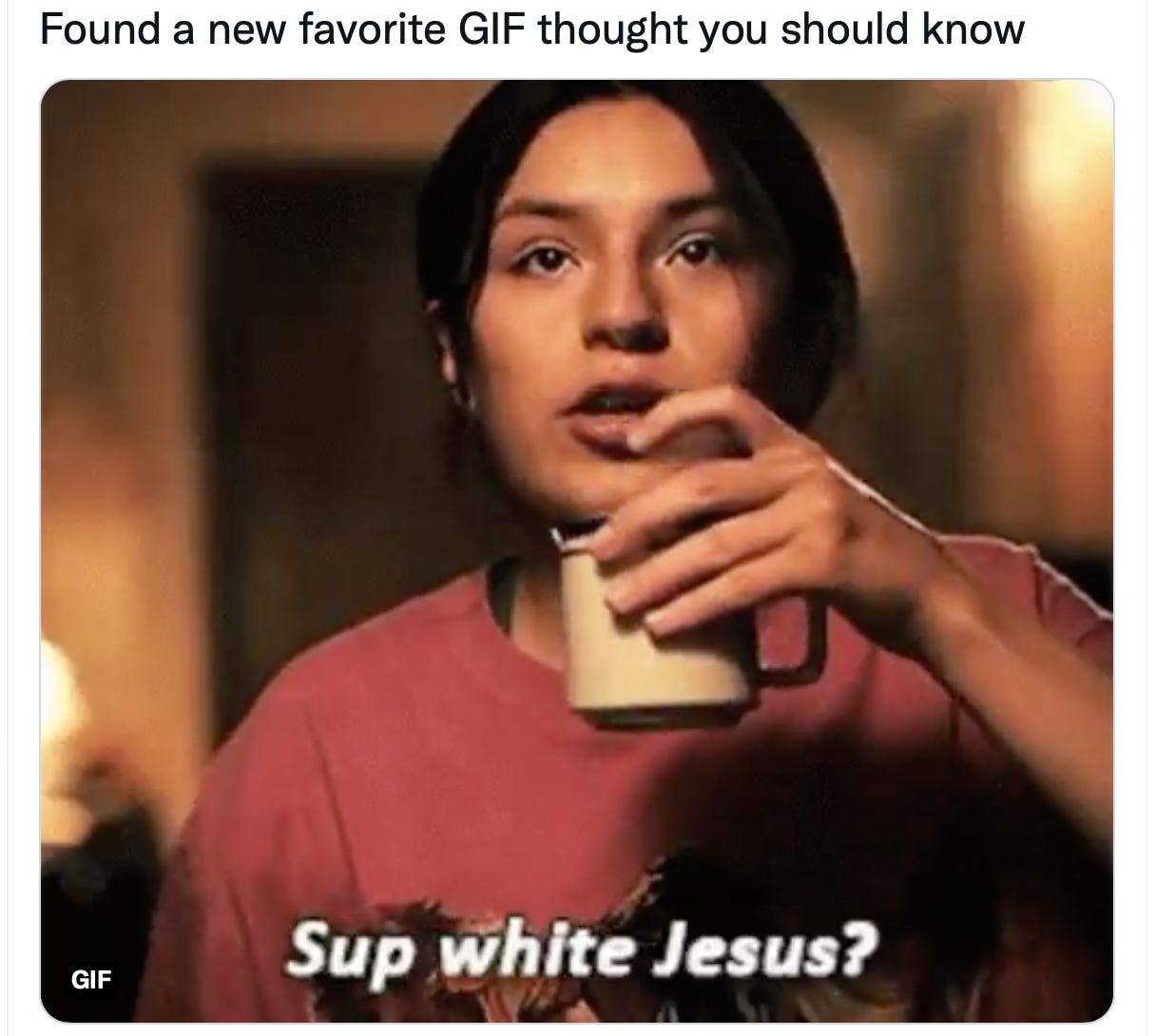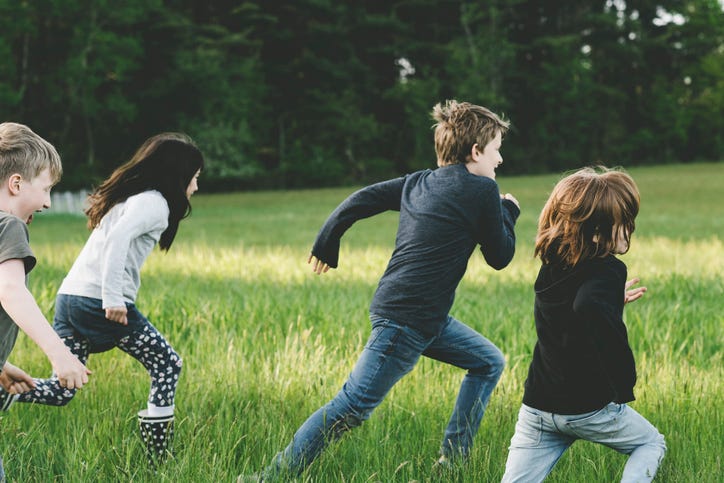Are We Saved or Traumatized by American Christianity?
somebody that I used to know series
Hello, friends!
This coming Saturday is Spring Solstice, so look for something special from me in your inbox toward the end of the week! You know I love a good ritual, and I can’t wait to share a new one with you.
Today, we’re getting down to it—a piece I wrote a few years ago called Are We Saved or Traumatized by American Christianity? oof.
This is a tough one, and you may not agree with what I write or embody here. Growing up in the Southern Baptist church and being deeply entrenched in evangelical white churches for years, I didn’t have language for a lot of this stuff until more recently, and this was one of those pieces that I just really needed to write.
As always, the bolded words are me today interacting with me then. I hope the words here are helpful for you, wherever you are on your spiritual journey.
Here we go:
Are We Saved or Traumatized by (white) American Christianity?
When I was seven years old, I prayed the “sinner’s prayer,” asking Jesus to “come into my heart” to save me from sin and death. If you grew up in a conservative Christian household, maybe you did the same. From that point on, my spiritual life was shaped by this duality: saved or not saved, bound for heaven or bound for hell.
It affected every relationship I had, because it affected me at the core of who I am. How do you explain any of this to a seven year old, a nine year old—as soon as we are “saved” we are expected to take on a huge responsibility. I had no idea that in the following years I would be shouldered with responsibilities I never should have had as a child/teenager, and it took years of therapy to unpack all of that.
In bible studies and at youth events, I grew up learning about how to best share our “personal testimony,” that story of how we came to be saved, how we were transformed from sinners to people who look more and more like Jesus every day.
The problem was that the Jesus we were being trained to look like doesn't look anything like the actual Jesus-- we were being trained as cogs in the machine of Christian empire. The wild thing is that we were constantly made to feel like possibly that first prayer didn’t quite take. Did we mean it? Have we sinned too much since for God to have taken it all back? In the coming years during the “invitation” at church I’d go forward every now and then, go sit in a room with an older person counseling me through whether I need to be re-saved. Living in a state of fear over your soul’s destination on a daily basis? That ticks the trauma box for me, folks.
Every time I was asked about my testimony, I would chase my memories back to my seven year old self, trying to find some fault in her. I wondered if, in that moment she prayed that prayer, she had some transformation, that a veil was lifted, that she saw everything around her more clearly. Surely, there were some awful underlying sins that she was hiding. Surely, she was a heathen before she prayed that prayer. Maybe she was extra selfish, and that was her downfall. Maybe she wasn’t grateful enough and needed the promise of heaven to fix it.
Maybe, though, she was just a kid, sacredly created and wholly loved by Mystery. In Native, I write about this a lot toward the end of the book. I write about those endless journal entries that begin with “God, I’m so sorry I didn’t do enough for you today.” I write about how I hope something better for my own kids, that they know they are beloved and held by a Sacred and loving God that values everything about them. It has absolutely nothing to do with a prayer. It has nothing to do with a white-washed Jesus or a testimony told at the right moment to save a soul.
As an adult, thanks to therapy and other safe spaces created with friends and family, I can revisit myself as a child. I can ask her questions, scan the recesses of her mind and imagination and see where she saw beauty and where she felt pain. As an adult, I can ask myself what my own trauma and anxiety stems from so that I can walk, write, sing, cry, run, or sometimes crawl my way through healing. And today I can visit Kaitlin when she was 22, 25, 30, yesterday years old. I can speak to her, hold space, ask questions without fear or shame.
It is enduringly hard work, but if we are to dismantle some of the dangers associated with the colonizing evangelical Christianity we’ve inherited, we’ve got to look our trauma in the eye and hold the institutions accountable that caused that trauma.
Am I saying that every church member, youth pastor, and evangelical is a monster?
No.
I am saying that collectively we’ve done monstrous things, and we need to pay attention to the damage done in spaces where we promised someone salvation from themselves based on a one-time prayer and snap of the fingers.
This interesting thing has happened to me over the last few years—in dreams, maybe once or twice a month, I have the opportunity to hang out with people from my younger Baptist years, or I’m walking into my childhood church, afraid, uncomfortable, wondering. The other night I dreamt that I was hanging out with people, feeling very un-seen, until I ran into Jason Momoa, and I was like “Hey Jason, I feel lonely here and I don’t know what kind of Christian I am,” and he was like, “Yeah me too” so we left and that was that. The point of the dream wasn’t Jason, but perhaps he represented all the other people living multiple identities, trying to figure out where they fit. That’s more complex than “did you pray the prayer” and we shouldn’t act like that’s all there is to this faith (or any faith for that matter). We are lonely as hell a lot of the time.
Maybe we need to go back and ask our child-selves some questions.
Maybe we need to give them some room to ask us questions.
Today, the stories of Jesus tell me of a man, a human, who used spit and dirt to heal. He escaped to countrysides and water to remember his connection to the land. He told empire to back the hell off, and he held the oppressed and the young close to his own heart without shaming them into submission. He made some mistakes and said some things he maybe shouldn’t have, too. I guess claiming all of that humanness scares us, but how can we escape it? In white American Christianity we want everything so damn spotless we forget how lovely it is to simply be human. Complex as hell, yes. But lovely, too.
I grew up hearing that we are to be in the world, but not of the world.
But today, all I want is to hold space in this world with my relatives, human and non-human alike.
As Robin Wall Kimmerer says in her book Braiding Sweetgrass, “We spill over into the world and the world spills over into us.” God, I love this quote. I always will.
If anything, the church has lost its ability to find its place in the midst of sacred creation. The church has been power hungry for too long, and has forgotten its need to stay humble and gentle, to learn from the world and the creatures in it, and to learn from the least of these when it has lost its way.
We lost our way when prayer became a weapon that we wielded toward others we thought needed saving.
Do we need to be saved from anything? Probably. We see the way that systems of hate and white supremacy have permeated the earth and destroyed people. We’ve seen how dangerous the ideas of in vs out, black vs white, us vs them can be. Maybe we need to save ourselves and each other from that wreckage. But we have to ask ourselves better questions and hold space for better answers.
Little Kaitlin? She saw something holy in the world around her, an awe and wonder that was slowly replaced with fear and shame.
We must do better by future generations inheriting a belovedly created and wholly loved world, and their wholly beautiful place in it.
We must be willing to lead them, and to stop and let them lead us. In order to be good ancestors, we begin with soft yet fierce love today.
There was a profound moment in our household when we realized that our kids don’t know anything about heaven or hell—if you’re a Christian reading this, you might be appalled, but there’s a beauty in talking about our spirits being gathered among the stars, as our ancestors believed, the Milky Way, the Spirit Path, and to move on to another place we may not understand but that is sacred nonetheless.
I’ll let my kids grow up believing in themselves and their friends, believing in love and the way that it moves here and beyond us somehow.
Are we saved or traumatized by this colonial Christianity we’ve inherited? Our kids deserve better than having to answer this question. May we give them opportunities to explore an expansive spirituality for themselves, and may we cheer them on along the way.










Hi Kaitlyn- this is so good, I can relate to much of what you talked about. I love that you are writing to you younger self and how you would handle things now - what a gift. Thank you for your writing and I also enjoyed your book Native. Thank you
Oh Kaitlyn- thank you so much for this. It just speaks to the depths of my soul.